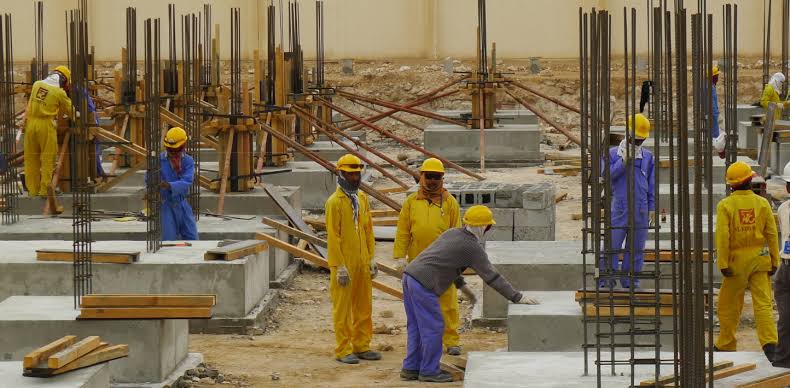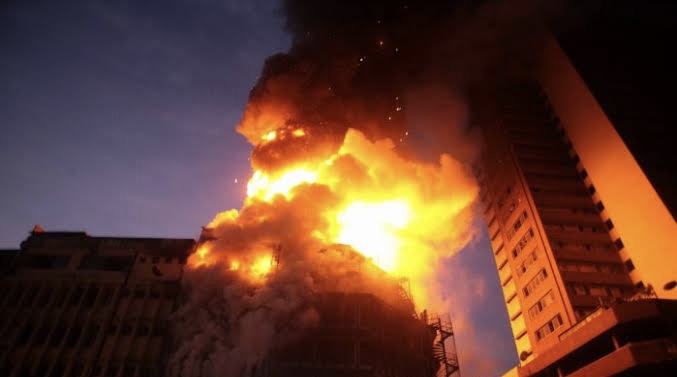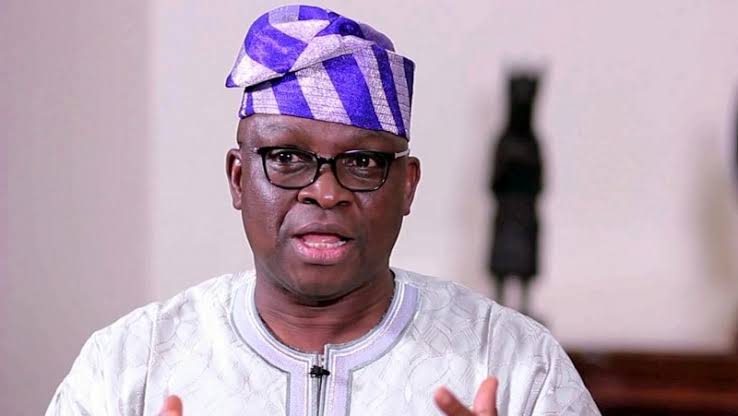Road To Qatar: Kafala; unjust system that built Qatar for World Cup

Many controversies surround Qatar’s hosting of the 2022 FIFA World Cup. One of them is the kafala system which provided cheap labour from migrant workers who toiled under harrowing conditions to build the stadiums that many fans will be jubilating in as the world’s greatest football show takes centre stage in November.
The Persian Gulf state has been mired in accusations of alleged corruption and rights abuses since the world football governing body handed it this year’s hosting rights. Peoples Gazette had covered some of the rights violation concerns in previous articles. But the kafala system presents a unique challenge that runs deeper and wider in impact.
Kafala means “sponsorship” in Arabic and is used in all Persian Gulf states, including the United Arab Emirates and Saudi Arabia, to control and manage their vast migrant populations who build these countries’ infrastructure.
Over 90 per cent of Qatar’s population are migrant workers, mainly from Pakistan, India and Bangladesh. But that percentage is similar in all Gulf states. They work for low wages, in high heat and often live in sprawling labour camps away from the big cities.
Essentially, kafala means that an employer is solely responsible for that worker’s visa and well-being. The system is popular amongst the citizens of the Gulf, as it keeps tight control over the population even as they are in the minority.
But this system has resulted in widespread abuse across the Middle East, ranging from movement restrictions and non-payment of wages to appalling accommodation, from arrests, alleged torture and deportation for demanding better conditions to suicide and even sudden death from working long hours in unimaginable heat.
Human rights organisations have for years decried this system. Human Rights Watch has called kafala a form of “indentured servitude”.
Yet it was Qatar’s winning World Cup bid – which it had hoped would put the country on the map – that has now exposed kafala, a system that had affected millions of workers.
But few know how kafala works.
In many cases, the exploitation doesn’t begin in the Middle East. It starts at home, as a long chain of governments, companies and individuals exploit some of the poorest people in the world.
Take Bangladesh, one of the largest exporters of workers. Remittances – wages sent home from abroad – make up as much as 10 per cent of the country’s GDP.
In villages far outside of sprawling cities like Dhaka, there are few opportunities for work outside of subsistence farming. Agents are sent out to the villages to find workers, often poor and illiterate, offering opportunities to make large sums of money in the Middle East.
The agents have already secured visas from Middle East countries, which have been raised and approved by companies and government departments back in the UAE, Saudi or Qatar. The visa comes at a price, money that they do not have.
So they will borrow money against the family’s land to pay the agent, the going rate for a Qatari visa being around £3,500, a considerable sum in Bangladesh where per capita income is just about £1000.
Bribes would usually have to be paid all along the line in Bangladesh, from getting a passport to sorting out the paperwork. Once they have arrived in the Middle East, many problems present themselves.
One of the biggest is low pay, often far lower than the contract they had signed back home. Some workers can be paid as little as £200 a month, making it virtually impossible to send any money home.
The worker is also trapped because if they return home, they will have to repay the loan they took on their family’s land. Without the money, the family is homeless, so the worker stays, unable to send much money home or leave to find a better solution.
Kafala means that workers cannot change jobs without their employer’s permission. In the case of Saudi Arabia and Qatar, they cannot even leave the country without their employer’s say so. So, millions of workers toil for a pittance in extreme heat.
Even if they could afford it, they are exiled from living in the cities and herded into migrant labour camps with often awful sanitary conditions, living from eight to sixteen people in a room.
Worse, your wages and conditions are often judged by your country of origin and how hard your embassy is willing to stand up for you. As remittances are so crucial to the Bangladeshi government, workers complain that they are paid the lowest wages and given the harshest treatment.
Their embassy is unlikely to rock the boat. As Dr Chowdhury Abar, director of the refugee and migratory movements research unit at the University of Dhaka, explained, the Bangladeshi government “does not stand up for the migrants with as much strength and support as they should … We are fearful as a country that if we speak too much about rights and good treatment of migrant workers we would lose the labour market.”
No one is even sure how many workers have died or how they have died. Few statistics on worker deaths in the UAE, Qatar and Saudi exist. It is in that context that the 2022 World Cup was being built.
Initially, the plight of workers building stadiums and infrastructure in Qatar had received minimal coverage. But international reporting and persistent reports from human rights organisations brought the issue to the fore.
Qatar made limited reforms to the system, but FIFA came under withering criticism for allowing the exploitation to take place in the first place. In a 2016 report from Amnesty International, Secretary General Salil Shetty wrote about the sufferings of these migrants and how it has built stadiums where fans will be hoping to achieve their dreams, stadiums which are structural representations of the living nightmare of many.
The negative press forced both FIFA and the host nation to start taking steps to address the issue. The government set up a “Workers Charter” and created an electronic system to monitor wages to end late and underpayments. But changes had been promised before and not been implemented, and at times it felt like true reform was being given lip service.
And then, the cause of workers’ rights in the Gulf got a boost from an unlikely source. A political and economic boycott between Saudi Arabia, the UAE, Bahrain and Egypt against Qatar has prompted a new wave of worker reforms.
Qatar announced that kafala was, effectively, to be abolished, including the need to ask your employer for an exit visa. Contracts would have to be lodged with a central committee so that workers would get the same wages they were promised back home.
And most significantly, a minimum wage would exist to end the practice of different salaries for different countries, even for the same jobs, which had been criticised for being racist.
This would mark a significant shift and see far better protection for workers than the United Arab Emirates, which has largely ignored calls to bring genuine reform. Although there would still be restrictions on workers, it isn’t quite the full repeal of kafala that has been promised.
Still, the International Trade Union Confederation and the recent World Report by Human Rights Watch, two organisations that have been sharply critical of Qatar, hailed the move as a positive step.
Millions of workers continue to pour into the Middle East, escaping grinding poverty and hoping for a better life. But, a word of caution. Promises have been made before.
Often laws have been passed, but there has been little implementation on the ground, making any legal changes largely irrelevant.
Human Rights Watch wrote that “These measures would be pathbreaking for Gulf countries where migrants make up most of the labour force, but the announcement gives little detail on how laws will be amended, how the changes will be carried out, or the timeframe for their implementation.”
As Nicholas McGeehan, a human rights advocate who has been one of the most visible champions for better worker rights across the Gulf, tweeted after the announcement: “@HRW take an optimistic view of the human rights situation in #Qatar in their World Report.”
It’s OK if they choose to be optimistic, hoping they are proven right. Many aren’t as positive, and we can only hope they are wrong.
We have recently deactivated our website's comment provider in favour of other channels of distribution and commentary. We encourage you to join the conversation on our stories via our Facebook, Twitter and other social media pages.
More from Peoples Gazette

Politics
Katsina youths pledge to deliver over 2 million votes to Atiku
“Katsina State is Atiku’s political base because it is his second home.”

States
Court remands man for alleged armed robbery
The prosecutor said that the complainant’s mobile phones were eventually tracked to the suspect.

NationWide
Fire breaks out at MMIA, flight operations diverted to D-Wing
Mrs Orah said that efforts to ventilate the smoke from the building were in progress.

States
Alleged Money Laundering: Judge’s absence stalls ex-governor Fayose’s trial
The ex-governor’s trial will continue on the next adjourned date.

NationWide
Bonny-Bodo Road: FG dangles additional N20 billion before Julius Berger
“No contractor will dictate to this ministry.’’

Showbiz
NANTA engages 400 travel agents to market Badagry tourism sites
“This is our way of showcasing Lagos as a preferred tourist destination.’’

Education
UNICROSS alumni begin legal battle for governing council’s dissolution
The alumni accused the council of pressurising the finances of the institution.








